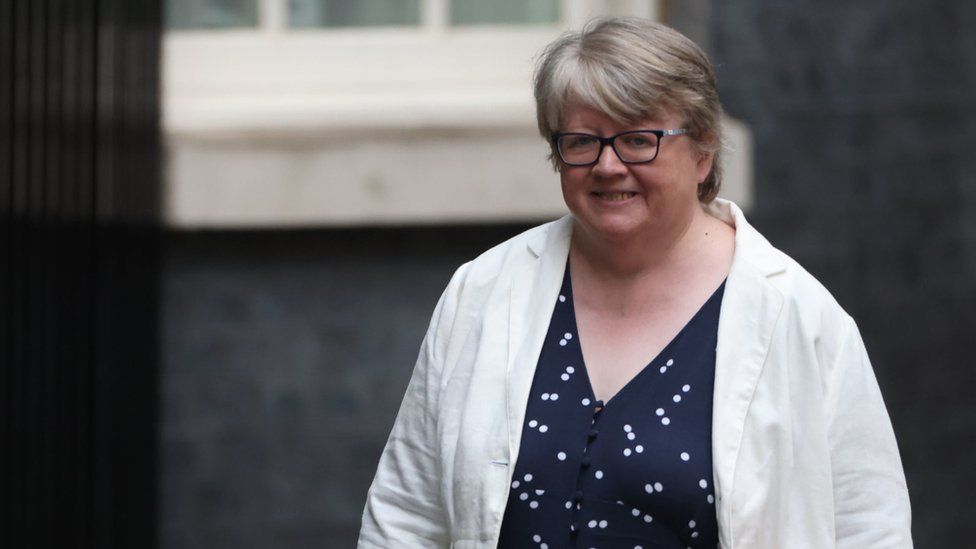ARTICLE AD BOX
By Ione Wells
Political correspondent
 Image source, PA Media
Image source, PA Media
The British Pregnancy Advisory Service has called the new health secretary's record on abortion rights "deeply concerning".
Therese Coffey has been appointed as health secretary by new Prime Minister Liz Truss.
Ms Coffey previously voted to revoke access to at-home abortion care, and against extending abortion rights to women in Northern Ireland.
The BBC has asked Ms Coffey for comment.
Leading pregnancy support and abortion charities have accused Ms Coffey of voting against the advice of leading medical bodies and putting her personal beliefs "above expert clinical guidance".
Ms Coffey recently voted against making at-home abortion pills, introduced during the pandemic, permanently available in England and Wales.
It was a free vote in the Commons, meaning that MPs made a decision based on their own beliefs, rather than on party lines.
In June, when asked about her views on access to abortion in an interview with Sky News, Ms Coffey said: "Abortion law isn't going to change in this country."
Ms Coffey, who is practising Catholic, said she would "prefer that people didn't have abortions but I am not going to condemn people that do".
As a backbencher in 2010, Ms Coffey also introduced a motion in Parliament which called for "mental health assessments" for women seeking an abortion.
Her motion in 2010 said: "In its 14 March 2008 statement the Royal College of Psychiatrists advised that healthcare professionals who assess or refer women who are requesting an abortion should assess for mental disorder and for risk factors that may be associated with its subsequent development" and called on the government to "give its full backing to mental health assessments for women presenting for abortion".
She voted against extending abortion rights to women in Northern Ireland, but wrote at the time this was because she supported devolution and did not believe the UK Parliament should be "exercising direct rule on this issue".
Ms Coffey also defended former Health Secretary Jeremy Hunt after he said he believed the abortion limit should be reduced to 12 weeks, tweeting that the "majority of European countries have [a] 12 week limit #abortion".
Clare Murphy, chief executive of the British Pregnancy Advisory Service (BPAS), said while politicians are entitled to their own views on abortion, what mattered was whether their "personal convictions stand in the way of women's ability to act on their own".
Ms Murphy told the BBC: "Earlier this year, the new health secretary voted to revoke access to at-home abortion care, and recriminalise women who end their own pregnancies without the approval of two doctors.
"In doing so, Therese Coffey voted against the advice of leading medical bodies including Royal College of Obstetricians and Gynaecologists, the Royal College of Midwives and the BMA.
"To have a health secretary who would place their personal beliefs above expert clinical guidance is deeply concerning."
Ms Murphy said the UK should be "a beacon for women's reproductive choice", especially after the repeal of Roe v Wade, a legal precedent that safeguarded access to abortion in the US.
"Anti-abortion protest activity is escalating, with women and clinic staff facing intimidation while seeking to access and provide an NHS-funded service," Ms Murphy said.
"Every week, women with complex medical conditions are forced to continue pregnancies against their will because of a lack of appointments within NHS hospital settings.
"We need a health secretary who wants to improve access to a medical procedure that one in three women will need in their lifetime, not impose further restrictions."
Rosie Duffield calls for the government to enshrine in law "a woman's right to choose".
When the new PM, Liz Truss, was foreign secretary, the UK government organised a multinational statement committing to the rights of women and girls as part of an intergovernmental conference it hosted in London in early July.
It was later amended to remove references to "sexual and reproductive health and rights" and "bodily autonomy".
The joint statement was signed by 22 countries before it was amended. One country, Malta, where abortion is illegal, has signed since the amendment.
A question was tabled on 19 July 2022 to ask Ms Truss about the decision to remove reference to reproductive healthcare from the statement.
Foreign minister Vicky Ford responded on behalf of Ms Truss and said: "In our capacity as chair of the event, we amended the statement we made at the Freedom of Religion or Belief Conference to make the final statement more inclusive of all perspectives and views to allow for a constructive exchange of views on all issues."
Labour MP Stella Creasy, who has campaigned to make abortion a human right in the UK, told the BBC: "There's every reason to believe this new administration will lead to abortion access being reduced because the new prime minister herself removed a commitment to protecting this from her own international activity.
"It's why we have to put the freedom of women in the UK to choose to have an abortion beyond interference just as the government has pledged to protect freedom of speech from interference too."

 2 years ago
40
2 years ago
40








 English (US)
English (US)